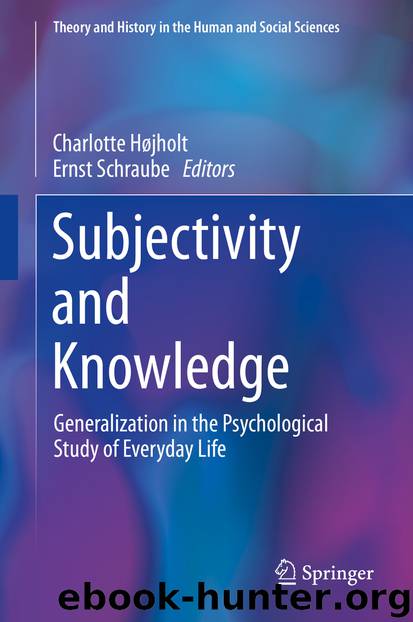Subjectivity and Knowledge by Charlotte Højholt & Ernst Schraube

Author:Charlotte Højholt & Ernst Schraube
Language: eng
Format: epub
ISBN: 9783030299774
Publisher: Springer International Publishing
From Ethical Symmetry as Research Strategy to Mutual Learning as Ontological Necessity
Childhood Studies ’ ambition to co-research children’s agency and knowledge creation as relational phenomena is also ingrained in the thoroughly conceptualized co-researcher concept that dialectical-critical Psychology from the Standpoint of the Subject (PSS ) proposes. Here, children’s and adults’ subjectivity and knowledge creation processes are mutually constitutive, and therefore call for ongoing dialog across adult and children’s perspectives on how to understand and meaningfully act together in everyday life. Mutual learning (Højholt and Kousholt 2019) is an ontologically and epistemologically unavoidable phenomenon, a constitutive process that makes it possible to tackle a general human condition that limits our respective knowledges, namely epistemic asymmetry : not only do we partake in knowledge creation from different positions in society, but also on the grounds of different first-person perspectives—and all of these are significant for learning about how the conditions we are dependent of are constituted. With explicit inspiration from phenomenology, Schraube (2013) connects epistemic asymmetry to the notion of ontological symmetry :In human relations the other has no direct access to any first-person mental phenomena except her/his own. Only I can know what I experience, think, feel, or why I have acted or act in such and such a way. From this epistemic asymmetry, … it follows that there is a fundamental ontological symmetry in human relations. As I experience myself and the world from my perspective, and act in the world from my perspective and standpoint, then logically the other also experiences her/himself and the world from her/his perspective and acts from her/his perspective and standpoint in the world. This reflexive reciprocity of the subjects’ first-person perspectives in human relations can be characterized as a symmetrical reciprocity of the first-person perspective or as intersubjective symmetry and is a fundamental distinguishing feature of human sociality. Human sociality builds on intersubjective symmetry and the reciprocal recognition of the other’s first-person perspective. Social thought is therefore actually symmetrical thought and has to be based on an understanding of the other as coequal center of intentionality and origin of her/his agency and on an inclusion of the other’s interests, perspectives and standpoint. (p. 26)
Download
This site does not store any files on its server. We only index and link to content provided by other sites. Please contact the content providers to delete copyright contents if any and email us, we'll remove relevant links or contents immediately.
Rewire Your Anxious Brain by Catherine M. Pittman(18630)
Talking to Strangers by Malcolm Gladwell(13339)
The Art of Thinking Clearly by Rolf Dobelli(10407)
Mindhunter: Inside the FBI's Elite Serial Crime Unit by John E. Douglas & Mark Olshaker(9310)
Becoming Supernatural by Dr. Joe Dispenza(8194)
Change Your Questions, Change Your Life by Marilee Adams(7732)
Nudge - Improving Decisions about Health, Wealth, and Happiness by Thaler Sunstein(7689)
The Road Less Traveled by M. Scott Peck(7581)
The Lost Art of Listening by Michael P. Nichols(7485)
Mastermind: How to Think Like Sherlock Holmes by Maria Konnikova(7312)
Enlightenment Now: The Case for Reason, Science, Humanism, and Progress by Steven Pinker(7303)
Win Bigly by Scott Adams(7181)
The Way of Zen by Alan W. Watts(6589)
Daring Greatly by Brene Brown(6500)
Big Magic: Creative Living Beyond Fear by Elizabeth Gilbert(5739)
Grit by Angela Duckworth(5592)
Ego Is the Enemy by Ryan Holiday(5406)
Men In Love by Nancy Friday(5225)
The Laws of Human Nature by Robert Greene(5154)
